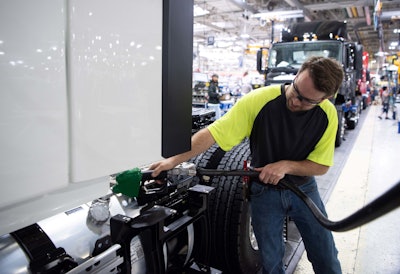Trucking news and briefs for Thursday, April 25, 2024:
Mack, Volvo using renewable diesel to move new trucks off assembly lines
 Volvo and Mack are fueling new trucks leaving their New River Valley and Lehigh Valley Operations plants, respectively, with hydrotreated vegetable oil, also known as renewable diesel.Volvo Trucks North America
Volvo and Mack are fueling new trucks leaving their New River Valley and Lehigh Valley Operations plants, respectively, with hydrotreated vegetable oil, also known as renewable diesel.Volvo Trucks North America
Mack Trucks and Volvo Trucks on Wednesday announced that the companies are using hydrotreated vegetable oil (HVO), or renewable diesel, in newly assembled trucks moving off the assembly line.
Mack said HVO is being used to move completed Class 8 trucks off its production line at Lehigh Valley Operations (LVO), in Macungie, Pennsylvania.
“The utilization of HVO will help Mack in its journey to promote the decarbonization of the transportation industry,” said Jonathan Randall, president of Mack Trucks North America. “Whether it’s through the use of HVO, or through the development of Mack battery-electric vehicles, such as the Mack LR Electric refuse and Mack MD Electric models, Mack is committed to reducing its carbon footprint and achieving our sustainability goals.”
Mack estimated that by utilizing HVO, LVO was able to reduce carbon emission by about 18%.
Volvo is using HVO at its New River Valley (NRV) plant in Dublin, Virginia.
“Today and for the foreseeable future, there will not be a one-size fits all approach to decarbonizing transportation,” said Peter Voorhoeve, president, Volvo Trucks North America. “That is why, at Volvo Trucks, we are focused on the three-pillar strategy with battery electric, hydrogen fuel cell and renewable fuels in the internal combustion engine. With the all-new Volvo VNL and by utilizing HVO, we can make the most substantial and immediate impact today. There is a future for the ICE and we’re happy to be doing all factory fills with renewable fuel, an important step towards walking the talk in our sustainability journey.”
Volvo is fueling new trucks leaving the NRV plant with 20 to 25 gallons of HVO per tank, with full tanks provided for trucks destined directly to customers. This initiative is expected to replace 1,125,000 gallons of fossil-based diesel annually, achieving an estimated 75% to 85% reduction in CO2 emissions for Volvo Trucks' operations in North America.
HVO can be used interchangeably with petroleum diesel. Renewable diesel at any blend up to a maximum of 100% (RD100) that conforms to ASTM D975 or EN15940 will not adversely affect engine or aftertreatment performance or durability.
[Related: Renewable diesel a more effective tool to decarbonize trucking than BEV, report says]
CARB launching pilot program for ‘zero-emission’ truck financing program
The California Air Resources Board is poised to launch a pilot Zero-Emission Heavy-Duty Vehicle Air Quality Loan Program in conjunction with the California Pollution Control Financing Authority through their California Capital Access Program (CalCAP).
The new pilot program will offer financing opportunities for medium- and heavy-duty zero-emission vehicles. As an “Independent Contributor” to CalCAP, CARB will contribute a percentage of an enrolled loan into a “loan loss reserve” account for each participating financial institution.
With these funds available, lenders are better equipped to lend to businesses that need a little extra assistance and typically offer more favorable terms than the business would qualify for otherwise.
The pilot program will be offered statewide. Eligible small fleets can apply for a loan through a participating lender, who will then submit an enrollment application directly to CalCAP. The pilot will be open to fleets with 20 or fewer medium- and heavy-duty vehicles. Purchased vehicles must be new or used zero-emission and on-road with a gross vehicle weight rating over 8,500 pounds. CARB said a warranty purchase is eligible when combined with a vehicle purchase.
An initial funding allocation of $5 million was provided in the CARB Fiscal Year 2022-2023 Funding Plan to create the pilot ZE Heavy-Duty Vehicle Air Quality Loan Program. The pilot will help program staff learn about what small business fleets need to transition to zero-emission vehicles by analyzing project data and evaluating deployment success. Staff will also monitor pilot participation in disadvantaged and low-income communities and solicit input from lenders and borrowers to understand how the program has influenced purchasing behaviors.
Averitt celebrates 20th year as SmartWay partner
Averitt (CCJ Top 250, No. 22) is commemorating two decades of commitment as a founding member of the SmartWay program.
Since joining the program, Averitt has demonstrated dedication to sustainability and environmental responsibility, advancing supply chain efficiency and reducing carbon footprints.
Established in 2004, the SmartWay program, an initiative pioneered by the Environmental Protection Agency (EPA), serves as a model of cooperation between public and private entities to promote sustainable practices within the freight transportation industry.
By implementing rigorous measurement, benchmarking, and continual improvement strategies, SmartWay empowers companies to make informed decisions that enhance fuel efficiency and reduce emissions throughout their supply chains.
Since joining, Averitt has achieved:
- 36% reduction in CO2 emissions
- 84% reduction in NOx emissions
- 5.4 million gallons of diesel fuel saved
"Averitt is honored to celebrate 20 years of partnership with the SmartWay program," said Gary Sasser, chairman and CEO at Averitt. "Our longstanding commitment to sustainability is a core value that guides our operations and underscores our responsibility to future generations. We never stop looking for more environmentally friendly ways to do business. Because we know the choices we make today will directly affect the world we’ll leave behind tomorrow."
Texas community college gets boost to CDL program
The Houston Community College (HCC) commercial truck driving program received a Regional Jobs and Education for Texans (JET) grant from the Texas Workforce Commission (TWC) in the amount of $332,000.
The grant has allowed HCC to add two tractor-trailers to its fleet that are equipped with newer technologies like adaptive cruise control, auto braking, lane departure sensors and disc brakes, the college said.
Students will also benefit from the addition of a fourth full-motion simulator that allows students to get familiar with components and the concepts of truck maneuvers such as shifting, backing and turning before they get into the vehicle.
“The new simulator increases our capacity to train 25% more students than we can accommodate, and these improvements will help assure that HCC graduates are among the best in the industry,” said Chancellor Margaret Ford Fisher.
The Texas Workforce Commission JET program provides grants to eligible entities to purchase and install equipment necessary for the development of career and technical educationcourses or programs that lead to a license, certificate, or post-secondary degree in a high-demand occupation.
“The new trucks introduce students to high technology found in industry and the simulator allows students to train in a safe environment with less stress and helps HCC to prepare students for road conditions found in other regions outside of Texas that include heavy snow or mountainous areas,” said Martin Garsee, HCC transportation director.
HCC offers six- and 12-week classes during the day, evenings and weekends.










